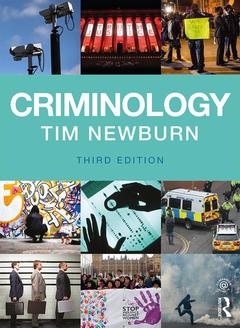Criminology (3rd Ed.)

Comprehensive and accessible, Tim Newburn?s bestselling Criminology provides an introduction to the fundamental themes, concepts, theories, methods and events that underpin the subject and form the basis for all undergraduate degree courses and modules in Criminology and Criminal Justice.
This third edition includes:
- A new chapter on politics, reflecting the ever increasing coverage of political influence and decision making on criminology courses
- New and updated crime data and analysis of trends, plus new content on recent events such as the Volkswagen scandal, the latest developments on historic child abuse, as well as extended coverage throughout of the English riots
- A fully revised and updated companion website, including exam, review and multiple choice questions, a live Twitter feed from the author providing links to media and academic coverage of events related to the concepts covered in the book, together with links to a dedicated textbook Facebook page
Fully updated to reflect recent developments in the field and extensively illustrated, this authoritative text, written by a leading criminologist and experienced lecturer, is essential reading for all students of Criminology and related fields.
Find online resources for both students and instructors at: https://routledgetextbooks.com/textbooks/9781138643130
Part 1: Understanding Crime and Criminology
1. Understanding Crime and Criminology
2. Crime and Punishment in History
3. Crime Data and Crime Trends
4. Crime and the Media
5. The Politics of Crime and its Control
Part 2: Understanding Crime: Theories and Concepts
6. Classicism and Positivism
7. Biological Positivism
8. Psychological Positivism
9. Durkheim, Anomie and Strain
10. The Chicago School, Subcultures and Cultural Criminology
11. Interactionism and Labelling Theory
12. Control Theories
13. Radical and Critical Criminology
14. Realist Criminology
15. Contemporary Classicism
16. Feminist Criminology
17. Late Modernity, Governmentality and Risk
Part 3: Understanding Crime: Types and Trends
18. Victims, Victimisation and Victimology
19. White Collar and Corporate Crime
20. Organised Crime
21. Violent and Property Crime
22. Drugs and Alcohol
Part 4: Understanding Criminal Justice
23. Penology and Punishment
24. Understanding Criminal Justice
25. Crime Prevention and Community Safety
26. Policing
27. Criminal Courts and the Court Process
28. Sentencing and Non-custodial Penalties
29. Prisons and Imprisonment
30. Youth Crime and Youth Justice
31. Restorative Justice
Part 5: Critical Issues in Criminology
32. Race, Crime and Criminal Justice
33. Gender, Crime and Justice
34. Criminal and Forensic Psychology
35. Green Criminology
36. Globalisation, Terrorism and Human Rights
Part 6: Doing Criminology
36. Understanding Criminological Research
37. Doing Criminological Research
Glossary
Bibliography
Index
Tim Newburn is Professor of Criminology and Social Policy at the London School of Economics. He is the author or editor of over 35 books, including: Permission and Regulation: Law and Morals in Post-war Britain (Routledge, 1991); The Future of Policing (with Rod Morgan, 1997); Private Security and Public Policing (with Trevor Jones, 1998); Policy Transfer and Criminal Justice (with Trevor Jones, 2007); Handbook of Policing (2008); Key Readings in Criminology (2009) and the Sage Handbook of Criminological Theory (with McLaughlin, 2010). Tim Newburn is currently writing the ‘Offi cial History of Criminal Justice’ with David Downes and Paul Rock, and continues to work (with Andrew Ward) on a book entitled Orderly Britain: How We Solve Our Everyday Problems from Dog Mess to Double Parking .
Date de parution : 02-2017
19.1x26.5 cm
Date de parution : 02-2017
19.1x26.5 cm
Disponible chez l'éditeur (délai d'approvisionnement : 14 jours).
Prix indicatif 250,90 €
Ajouter au panierThèmes de Criminology :
Mots-clés :
Young Man; Understanding Crime; Fi Ve; Understanding Criminal Justice; Police Offi Cers; Criminological Theory; Situational Crime Prevention; Criminological Research Methods; White Collar Crime; Critical Issues in Criminology; Police Service; Criminological Concepts; Pe Rc; Introduction to Criminology; Restorative Justice; Out-of Court Disposals; Traffi Cking; Youth Offending Team; Sex Offender; Youth Justice; Left Realism; Reintegrative Shaming; YJB; Contemporary Society; Crown Court; UK Drug Policy Commission; Police Forces; British Subcultural Theory; Repeat Victimisation; Strain Theory; Noncustodial Penalties; Capital Punishment
